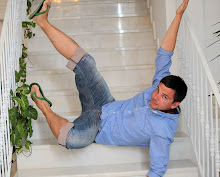Now I do have to say that I consider myself a bit of a film buff. It's fair to say that most of my knowledge of cinema is focused on the 1970's and everything that has happened since, but I have always thought that I had my finger sufficiently on the pulse and knew of all the classics from the so-called 'Golden-Era' of the movies. Yes I firmly believe, or at least did, that I am what one might describe as 'cine-literate'.
However, I must confess that until very recently I had not even heard of The Red Shoes. And why had it only come to my attention recently, I hear you ask. Well the answer is the much raved about and Oscar nominated Black Swan. During all of the press hoo-hah about the film, I read an article in the always dependable Culture supplement of The Sunday Times (I say always dependable, but the truth is I read the film reviews, then briskly flick to the TV listings at the back, sometimes slowing as the music section to see whether I've heard of any of the must-have albums) about how much Black Swan owes to the Michael Powell and Emeric Pressburger film The Red Shoes. It talked of the world of ballet, the parallel between the plot of the film and the story of the show portrayed in the film and also of the use of mirrors in both films.
And fast-forward a month, ticket for Secret Cinema purchased months ago, I turned up at Wapping tube station, having failed to decipher the clues, I had no idea what I was seeing. I was wearing a suit and a bowler hat (my attempt at dressing 'late 1940's' and we were led to Tobacco Dock, a massive building in the old docks area up the road from Tower Bridge and were transported to 1940's Covent Garden.
I'm not going to over-divulge in detail because I think the key to Secret Cinema is very much the secret element (the clue is in the name). The beauty is the discovering it yourself and getting it second hand from me isn't going to do it justice.
Anyway, even when I was in 1940's Covent Garden, with clues all around me, I still wasn't sure what we would be watching. I even had a conversation at the urinal with a stranger where I told him that I was convinced that it was going to be Moulin Rouge. In fact while I was in the toilet I missed a ballerina running through the venue referring to her new ballet shoes, which were bright red. My girlfriend took enormous delight in cracking the code and guessing the film before me.
So, after all the hullaballoo, is it any good?
The first thing to say is how spot on that Times article was. All of the things that I loved about the Black Swan, the things that I thought were original and clever tricks created and deployed by Darren Aronofsky, were also present and correct in The Red Shoes.
1940's cinema can sometimes feel, well, formal. It's all so proper. This formality can keep you distanced from what is happening on screen, like a business meeting. In The Red Shoes though, once you get past this, it is a very enjoyable and interesting bit of cinema. The world of ballet is presented with all the darkness and intrigue that it is in Black Swan, obsession and insecurity is common place. There is a fantastic sequence, where the ballet performance is shown, at some length, with some striking, beautiful and disturbing imagery. Like the 'transformation' scene in Black Swan but cranked up to 11 with bundles more spectacle. Hans Christian Andersen's fairy tale is a great parallel for the film. Like many fairy tales, and Swan Lake, there is a darkly black undercurrent to the story and this shines through, proving to be a cautionary tale - Be careful what you wish for.
The darkest character is Julian Craster (Marius Goring), the creative genius behind the show who puts the star, Victoria Page (Moira Shearer) on a pedestal, both in the public eye and in his own mind. He hams it up in a pantomime villain way and clearly loves every minute. Shearer herself is good as well, delicate but determined - the outcome always on a knife edge. A great study of how quickly someone can break down when under psychological strain.
It must be said that the film does drag a little, especially after I had a few beers beforehand, but it reaches a dark conclusion that I didn't see coming and probably shouldn't be in a U certificate film. A good 'oldie' and proof that Black Swan wouldn't be what it is without Michael Powell's exploration of ballet 60 years before. Most of all, another example of Secret Cinema being one of the best trips to the flicks there will ever be.

No comments:
Post a Comment